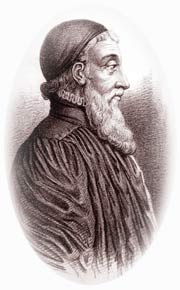
Menno Simons

Menno Simons was one of the most prominent leaders of the Anabaptist movement in the Netherlands during the 16th century. However, he was not the founder of the Anabaptist movement, nor even one of the first generation leaders. Menno’s leadership came at the time when the Anabaptist movement was in danger of losing its original identity. Menno championed the original peaceful Biblical Anabaptist concepts.
Menno Simons was originally a Roman Catholic priest. Gradually, Menno realized that the Bible should have preeminence over the tradition of the Roman Catholic Church. The Bible became the source of his authority and his sermons.
The events at Münster, where some spiritualist-Anabaptists tried to set up a “New Jerusalem, led Menno to finally surrender to Jesus Christ. Menno taught “the word of true repentance,” reproving all sin and wickedness and showing the people the narrow path. He soon became known among the Anabaptists as a capable and devoted leader.
Menno Simons was thoroughly Bible-centered in his beliefs and practices. The Bible became the cornerstone of his work. His theology and Biblical practices were also Christ-centered—rather than Paul-centered, as was the case with some of the reformers. He emphasized discipleship within the congregation, the Church of Christ. Menno believed that the requirements for church membership are regeneration and the willingness to bear the cross of Christ. In fact, Menno developed a theology of martyrdom or suffering.
Menno Simons’ leadership was extremely important to the Anabaptist movement. First, he prevented the collapse of the northern wing of the Anabaptist movement by his leadership, writing, and speaking. One of his books, the Foundation-Book, helped to restore the original Anabaptist concepts and principles. Menno’s writings were particularly effective. They were formed by a man who knew the scriptures and honestly wanted to give all for the Christian church and the glory of God. Through Menno’s devoted life, a distinctive witness in the Reformation movement, representing a Christian brotherhood and a Christian way of life was preserved. An example of these basic principles included separation of church and state, freedom of conscience, voluntary church membership, democratic church government, holy living, and Christian nonresistance.